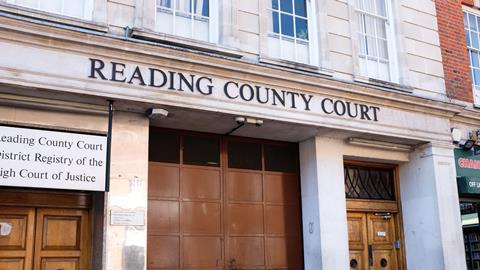A law firm has lost out on costs after a judge ruled it did not take reasonable steps to avoid a wasted hearing asked for by a former client who mistakenly thought the firm was going to sell her home.
Wokingham, Reading and Farnham firm Clifton Ingram had obtained a judgment against Donna Bolt over unpaid legal bills, which was enforced in August last year by way of a charging order against her share in her property. Bolt mistakenly believed the charging order was similar to an order for the sale of her home and so applied to have it set aside.
But at a prior hearing at Reading County Court (pictured) this week, Bolt accepted she had made the application under the ‘misapprehension’ there would be a sale. Clifton Ingram applied for the costs of that hearing, with barrister Luke Trim arguing ‘costs have been incurred effectively against their will’.
‘The defendant appears to be laying the blame for her own misunderstanding at the claimant’s feet, but looking at the correspondence, that just does not bear out’, Trim said. Trim pointed out Bolt failed to withdraw her claim after the firm contacted her on five occasions between January and February requesting her to withdraw.
An email from a Clifton Ingram solicitor to Bolt, read out in court, said: ‘I urge you to read the order received from the court’. But a separate email to Bolt’s solicitor read ‘in the absence of payment, we have been left with no other option but to proceed for an order for sale and the matters above will be brought to the court’s attention.’
Bolt, appearing as a litigant in person with a Mackenzie friend, said: ‘There was several threats of sale. I was under the impression from multiple correspondences that such an order was imminent, which has caused stress. A forced sale of my home at any point would have devastating, considering my financial responsibilities. I appeal for the court’s understanding and leniency.’
Deputy District Judge David Gray-Jones ruled that it would not be appropriate to order Bolt to pay the costs of the hearing, stating the firm should have sought a consent order vacating the hearing.
The judge said: ‘It seems to me that, although I have sympathy with the claimant’s position, the claimant should have been aware it was dealing with a vulnerable litigant in person.
'In my view, it would have been appropriate in accordance with the overriding objective for the claimant to have taken reasonable steps to try to avoid attendance at the hearing. The most obvious step was to try to deal with matters by consent.
‘This litigation has led to feelings on both sides being heightened, possibly understandably, but that is not always a helpful way in which to approach litigation,’ the judge concluded.



























